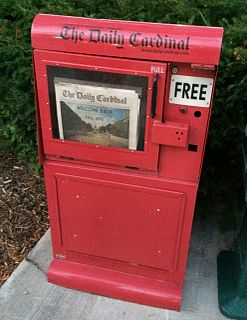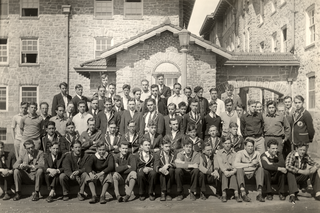
Alexander Meiklejohn was a philosopher, university administrator, educational reformer, and free-speech advocate, best known as president of Amherst College.

In the United States, freedom of speech and expression is restricted by time, place and manner— though otherwise strongly protected from government restrictions by the First Amendment to the United States Constitution, many state constitutions, and state and federal laws. Freedom of speech, also called free speech, means the free and public expression of opinions without censorship, interference and restraint by the government. The term "freedom of speech" embedded in the First Amendment encompasses the decision what to say as well as what not to say. The Supreme Court of the United States has recognized several categories of speech that are given lesser or no protection by the First Amendment and has recognized that governments may enact reasonable time, place, or manner restrictions on speech. The First Amendment's constitutional right of free speech, which is applicable to state and local governments under the incorporation doctrine, prevents only government restrictions on speech, not restrictions imposed by private individuals or businesses unless they are acting on behalf of the government. However, laws may restrict the ability of private businesses and individuals from restricting the speech of others, such as employment laws that restrict employers' ability to prevent employees from disclosing their salary to coworkers or attempting to organize a labor union.

The Wisconsin Idea is a public philosophy that has influenced policy and ideals in the U.S. state of Wisconsin's education system and politics. In education, emphasis is often placed on how the Idea articulates education's role for Wisconsin's government and inhabitants. In politics, the Idea is most associated with the historic political upheaval and subsequent reformation during the Progressive Era in the United States.

The Daily Cardinal is a student newspaper that serves the University of Wisconsin–Madison community. One of the oldest student newspapers in the country, it began publishing on Monday, April 4, 1892. The newspaper is financially and editorially independent of the university.
The Badger Herald is a newspaper serving the University of Wisconsin–Madison community, founded in 1969. The paper is published Monday through Friday during the academic year and once during the summer. Available at newsstands across campus and downtown Madison, Wisconsin and published on the web, it has a print circulation of 6,000.
The Mershon Center is an academic think tank at the Ohio State University in the United States. The institution was founded in 1952 when Colonel Ralph D. Mershon left funds to the university for the establishment of a research institution dedicated to research in the fields of international relations and security.
David Fellman was a political scientist and constitutional scholar and advocate for academic freedom. He taught general constitutional law, administrative law and civil liberties. He was born in Omaha, Nebraska and studied at the University of Nebraska before transferring to Yale University and receiving his Ph.D. in philosophy. He returned to the University of Nebraska as a professor until relocating to the University of Wisconsin-Madison in 1947, and remaining there until his retirement. He became involved in Wisconsin state government and participated in several commissions and panels which helped review and eventually recommend constitutional changes.

Carolyn Arthur "Biddy" Martin is an American academic, author, and the current president of Amherst College, in Amherst, Massachusetts.

William Cronon is an environmental historian and the Frederick Jackson Turner and Vilas Research Professor of History, Geography, and Environmental Studies at the University of Wisconsin–Madison. He was president of the American Historical Association (AHA) in 2012.

The Labor and Employment Relations Association (LERA), was founded in 1947 as the Industrial Relations Research Association, by a group who felt that the growing field of industrial relations required an association in which professionally-minded people from different organizations could meet. It was intended to enable all who were professionally interested in industrial relations to become better acquainted and to keep up to date with the practices and ideas at work in the field. To our knowledge there is no other organization that affords the multiparty exchange of ideas we have experienced over the years--a unique and valuable forum. The word "research" in our original name reflects the conviction of the founders that the encouragement, reporting, and critical discussion of research is essential if our professional field is to advance.
National Socialist Party of America v. Village of Skokie, 432 U.S. 43 (1977), arising out of what is sometimes referred to as the Skokie Affair, was a landmark decision of the US Supreme Court dealing with freedom of speech and freedom of assembly. This case is considered a "classic" free speech case in Constitutional law classes. Related court decisions are captioned Skokie v. NSPA, Collin v. Smith, and Smith v. Collin. The Supreme Court ruled 5–4, per curiam. The Supreme Court's 1977 ruling granted certiorari and reversed and remanded the Illinois Supreme Court's denial to lift the lower court's injunction on the NSPA's march. In other words: the Courts decided a person's assertion that speech is being restrained must be reviewed immediately by the judiciary. By requiring the state court to consider the neo-Nazis' appeal without delay, the U.S. Supreme Court decision opened the door to allowing the National Socialist Party of America to march.
William H. Sewell Jr. is an American academic. He is the Frank P. Hixon Distinguished Service Professor Emeritus of History and Political Science at the University of Chicago.
Board of Regents of the University of Wisconsin System v. Southworth, 529 U.S. 217 (2000), is a ruling by the Supreme Court of the United States which held that public universities may subsidize campus groups by means of a mandatory student activity fee without violating the students' First Amendment rights.

Walter Berns was an American constitutional law and political philosophy professor. He was a resident scholar at the American Enterprise Institute and a professor emeritus at Georgetown University.

The University of Wisconsin–Madison is a public land-grant research university in Madison, Wisconsin. Founded when Wisconsin achieved statehood in 1848, UW–Madison is the official state university of Wisconsin and the flagship campus of the University of Wisconsin System. It was the first public university established in Wisconsin and remains the oldest and largest public university in the state. It became a land-grant institution in 1866. The 933-acre (378 ha) main campus, located on the shores of Lake Mendota, includes four National Historic Landmarks. The university also owns and operates a National Historic Landmark 1,200-acre (486 ha) arboretum established in 1932, located 4 miles (6.4 km) south of the main campus.
The Society for Academic Freedom and Scholarship (SAFS) is a Canadian non-profit organization founded to promote academic freedom and intellectual excellence on Canadian institutions of higher education.

Glenn Frank was a president of the University of Wisconsin–Madison and The Century Magazine's editor-in-chief. He graduated from Northwestern University in 1912 and became Edward Filene's personal assistant, where he wrote two books on the side. He joined The Century Magazine as an associate editor and became its editor-in-chief in three years, which gave his views on education a wide audience. He was tapped to the University of Wisconsin's presidency in 1925, where he introduced the Experimental College before being ousted in 1937. Frank became involved in Wisconsin politics and ran for the state's United States Senate seat, but died with his son in a car accident two days before the Republican Party primary.

The University of Wisconsin Experimental College was a two-year college designed and led by Alexander Meiklejohn inside the University of Wisconsin–Madison with a great books, liberal arts curriculum. It was established in 1927 and closed in 1932. Meiklejohn proposed the idea for an alternative college in a 1925 Century magazine article. The magazine's editor-in-chief, Glenn Frank, became the University of Wisconsin's president and invited Meiklejohn to begin the college within the university. Despite pushback from the faculty, the college opened in the fall of 1927 with a self-governing community of 119 students and less than a dozen faculty. Students followed a uniform curriculum: Periclean Athens for freshmen and modern America for sophomores. The program sought to teach democracy and to foster an intrinsic love of learning within its students.

Sifting and winnowing is a metaphor for the academic pursuit of truth affiliated with the University of Wisconsin–Madison. It was coined by UW President Charles Kendall Adams in an 1894 final report from a committee exonerating economics professor Richard T. Ely of censurable charges from state education superintendent Oliver Elwin Wells. The phrase became a local byword for the tenet of academic freedom.

Education and Democracy: The Meaning of Alexander Meiklejohn, 1872–1964 is the first full biography of Alexander Meiklejohn written by Adam R. Nelson and published by the University of Wisconsin Press in 2001. The title is not a complete biography but draws from five archives to show Meiklejohn through his own words. A popular figure in the early 20th century who has since faded, Meiklejohn was a philosopher and university president who championed unified knowledge, idealism, and Great Books curricula. The book is split into five sections based on the locations in which Meiklejohn lived: his undergrad, faculty, and administrative years at Brown University, his presidency of Amherst College, his time with the University of Wisconsin Experimental College, and his experience with adult education and free speech advocacy at Berkeley. Nelson portrays Meiklejohn as "contradictory, paradoxical, and quixotic" as he grapples with how to encourage students to pursue freedom and how a teacher can teach this while respecting student freedom.













